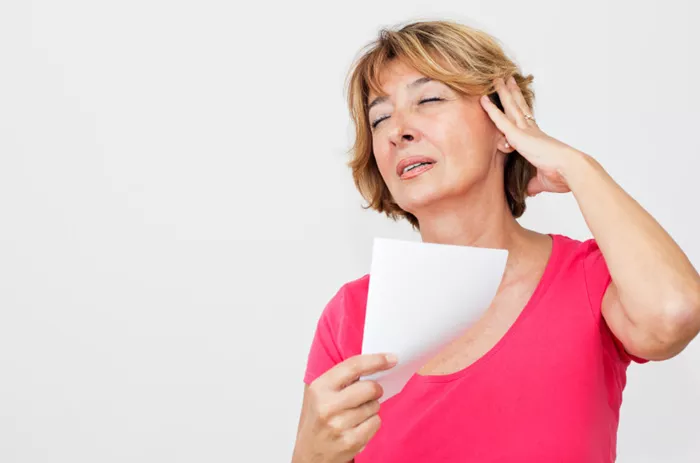Hot flashes are a common yet uncomfortable experience many women face during the day. These sudden feelings of intense heat can cause sweating, discomfort, and anxiety, often making daily activities harder to manage. Understanding what causes hot flashes and how to deal with them is essential for improving quality of life during these episodes.
What Are Hot Flashes?
A hot flash is a sudden sensation of heat, typically felt in the upper body or face. It often comes on without warning and can last anywhere from a few seconds to several minutes. Hot flashes can be mild or intense, and they are often accompanied by sweating, chills, and sometimes a racing heart. These symptoms can be troublesome, especially when they occur during daily activities.
What Causes Hot Flashes During the Day
Hot flashes primarily occur due to changes in the body’s hormone levels, especially during menopause. Here are some key causes:
Hormonal Changes During Menopause
The most common cause of hot flashes is hormonal fluctuations that occur as a woman approaches menopause. During this time, the body’s levels of estrogen and progesterone decrease, which affects the hypothalamus (the part of the brain responsible for regulating body temperature). This hormonal change can cause the body to misinterpret temperature, leading to hot flashes.
Perimenopause and Menopause
Women typically experience hot flashes during perimenopause, the period leading up to menopause. This transition can last several years, and hot flashes may be a frequent and frustrating symptom. Menopause officially occurs when a woman has not had a menstrual period for 12 consecutive months. At this point, the body has fully transitioned to lower estrogen levels.
Other Factors Affecting Hormone Levels
While menopause is the leading cause, other factors can contribute to hormone imbalances that trigger hot flashes. These include:
Pregnancy: Hormonal changes during pregnancy can cause hot flashes.
Certain medications: Hormonal therapies, such as birth control or hormone replacement therapy, can impact hormone levels and lead to hot flashes.
Thyroid imbalances: An overactive thyroid can cause symptoms similar to hot flashes, such as sweating and a sensation of heat.
Stress and Emotional Factors
Stress, anxiety, and other emotional triggers can also cause hot flashes. The connection between emotional stress and hot flashes lies in how stress hormones, like cortisol, interact with the body’s temperature regulation system. Increased stress can activate the sympathetic nervous system, which in turn can bring on hot flashes.
Lifestyle and Environmental Factors
Certain environmental and lifestyle factors can also contribute to the frequency of hot flashes. These include:
- Hot weather: A rise in external temperature can make a woman more likely to experience hot flashes.
- Spicy foods: Spices can trigger hot flashes for some women, as they may cause the body’s temperature to rise.
- Caffeine: High caffeine intake has been linked to an increased frequency of hot flashes.
How to Manage Hot Flashes During the Day
There are various methods women can use to manage hot flashes during the day. These can include lifestyle changes, medical treatments, and home remedies.
Lifestyle Changes
- Stay cool: Dressing in layers allows you to adjust to temperature changes more easily.
- Stay hydrated: Drinking water throughout the day helps regulate your body’s temperature.
- Exercise: Regular physical activity can help regulate hormone levels and reduce the frequency of hot flashes.
- Reduce triggers: Avoiding spicy foods, caffeine, and stressors can help reduce the occurrence of hot flashes.
Medical Treatments
If hot flashes are frequent or disruptive, a healthcare provider may recommend treatments, including:
Hormone replacement therapy (HRT): This treatment involves taking hormones to balance estrogen levels and reduce hot flashes.
Non-hormonal medications: For women who cannot take HRT, there are other medications like antidepressants and gabapentin, which can help reduce hot flashes.
Alternative Remedies
Some women find relief from hot flashes using natural remedies, such as:
Herbal supplements: Black cohosh and red clover are commonly used to help with hot flashes, though their effectiveness varies.
Acupuncture: Some studies suggest acupuncture can help reduce the frequency and intensity of hot flashes.
Frequently Asked Questions
1. Can hot flashes happen during the night?
Yes, hot flashes can occur during the night and are referred to as “night sweats.” These can interrupt sleep and leave you feeling tired and irritable the next day.
2. How long do hot flashes last?
The duration of hot flashes can vary. Some women experience them for a few months, while others may have them for several years. The frequency and intensity typically decrease after menopause.
3. Can hot flashes be prevented?
While it may not be possible to completely prevent hot flashes, their frequency and intensity can be managed through lifestyle changes, stress reduction, and medical treatments.
Hot flashes during the day can be distressing, but understanding their causes and knowing how to manage them can help women regain control of their lives. Whether through lifestyle adjustments or medical treatments, there are effective strategies for reducing the impact of hot flashes.
Related topics:
- Does Vitamin B12 Help With Hot Flashes?
- Can Soy Milk Help With Hot Flashes?
- Does Moringa Help With Hot Flashes?


